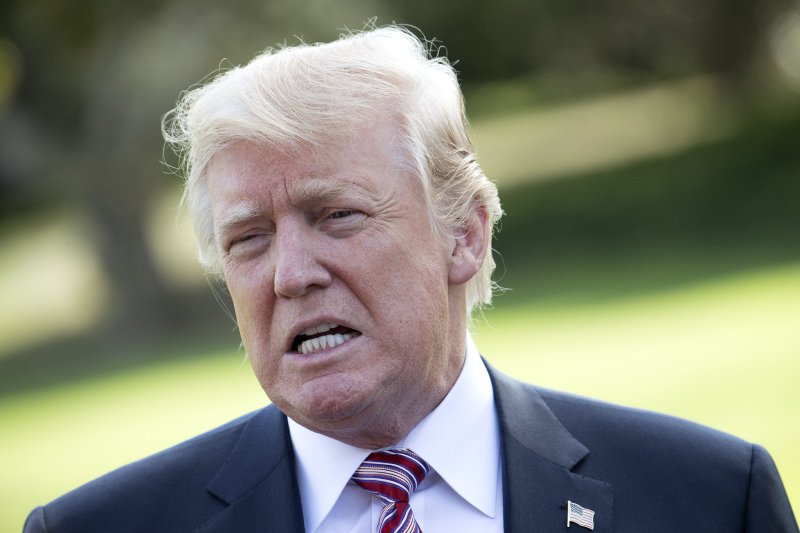President Donald Trump's supporters are motivated by a fear arising from the failure of government to govern. Photo by Kevin Dietsch/UPI |
License Photo
A specter is haunting America. But this is not Marx or Lenin's specter of communism. Perhaps worse, it is the specter of four political parties in a system in which the traditional division between Democrats and Republicans can hardly co-exist or govern.
One of the two newer contenders is the Trump party consisting of alienated or disenfranchised Republicans and Democrats. Motivated by a fear arising from the failure of government to govern that has become a burning anger, these Americans have turned to candidate Donald Trump in the hope that only he can clean the "swamp" in Washington. In their view, somewhat simplified, the prospects for healthcare, job security, education and the past pillars of the American dream have deteriorated. The rich are getting richer. "Average" or middle-class Americans are being left behind and bearing the costs of this great migration of wealth to those who already possess it.
This base, which also numbers discontent independents, consists of somewhere between 20 and 35 percent of the American electorate. However, given the failure of Republicans and Democrats to govern, exacerbated by the polarization of those parties around more extreme "right" and "left" factions, these Americans had nowhere else to go. Hence, Trump has been clever in playing to this base that while too small ever to approach a majority, is sufficiently robust to provide him enough support to govern.
The fourth and potentially the most powerful new party has no name yet. Indeed, its existence has not been fully recognized nor understood. And the size of this party may indeed be as large or larger ultimately than any of the other three groupings of traditional Republicans, Democrats and Trumpistas.
These are independents, Americans whose political views are largely of the center that encompassed the mainstream politics that generally existed throughout the country since the end of World War II. They, too, had no place to go. But Trump was not the answer. Nor was Hillary Clinton.
It is this group of Americans that could be decisive if properly rallied and led by the appropriate "centrist." Unfortunately, in politics, anyone who operates in the middle of the road is likely to be run over by the extremes of left and right and in the jargon become roadkill. As a result, the great leaders of the past who could safely navigate more centrist positions have been left behind.
Symptoms of this exodus include the growing number of centrist politicians who are not seeking further terms of elected office. And these signs of political change are reinforced by the reluctance of many Americans to serve in government. Many reasons account for this reluctance, ranging from the odious nature of fundraising to the absurd degree of transparency that reveals every possible flaw or past transgression, however minor, available on the Internet as false news and rumor passing as fact to the ubiquity of You-ube and near infinite numbers of cellphone cameras to record and intrude on even the most personal or private of moments.
The politician who understands this transformation and has the talent to exploit this redefinition could well become a future president. Today, however, the scorched earth policies followed by both mainstream political parties provide a rich field from which Trump can harvest some successes. The "Chuck and Nancy" show in which the president recruited the Democratic leaders of Congress --Chuck Schumer of the Senate and Nancy Pelosi of the House -- to resolve for the moment the debt ceiling crisis and dealing with the so-called "Dreamers," that is children of illegal immigrants brought into America at very young ages, is a prime example. The question here is whether the absence of any real political ideology in the president will suffice to permit pragmatism to dominate his actions.
While this process of dealing with the enemy unfolds, however, Trump's base will not be satisfied as the president becomes increasingly enmeshed inside the Washington swamp and not in cleansing it. Nor will Republicans in Congress who have been abandoned. Ironically, what will propel this fourth party to prominence will be the erosion and disillusionment of the presidential base of Trumpistas and other Republicans. A single metric will mark this moment. When or if Trump's approval rating crashes below the 30 percent barrier, a fourth political party will emerge.
This emergence may not presage Ronald Reagan's "morning in America." But it could revolutionize American politics. Whether this will be for the better remains to be seen.
Harlan Ullman has served on the Senior Advisory Group for Supreme Allied Commander Europe (2004-16) and is a senior adviser at Washington, D.C.'s Atlantic Council, chairman of two private companies and principal author of the doctrine of shock and awe. A former naval person, he commanded a destroyer in the Persian Gulf and led over 150 missions and operations in Vietnam as a Swift Boat skipper. His next book, "Anatomy of Failure: Why America has Lost Every War it Starts," will be published in the fall. Follow him on Twitter @harlankullman.















